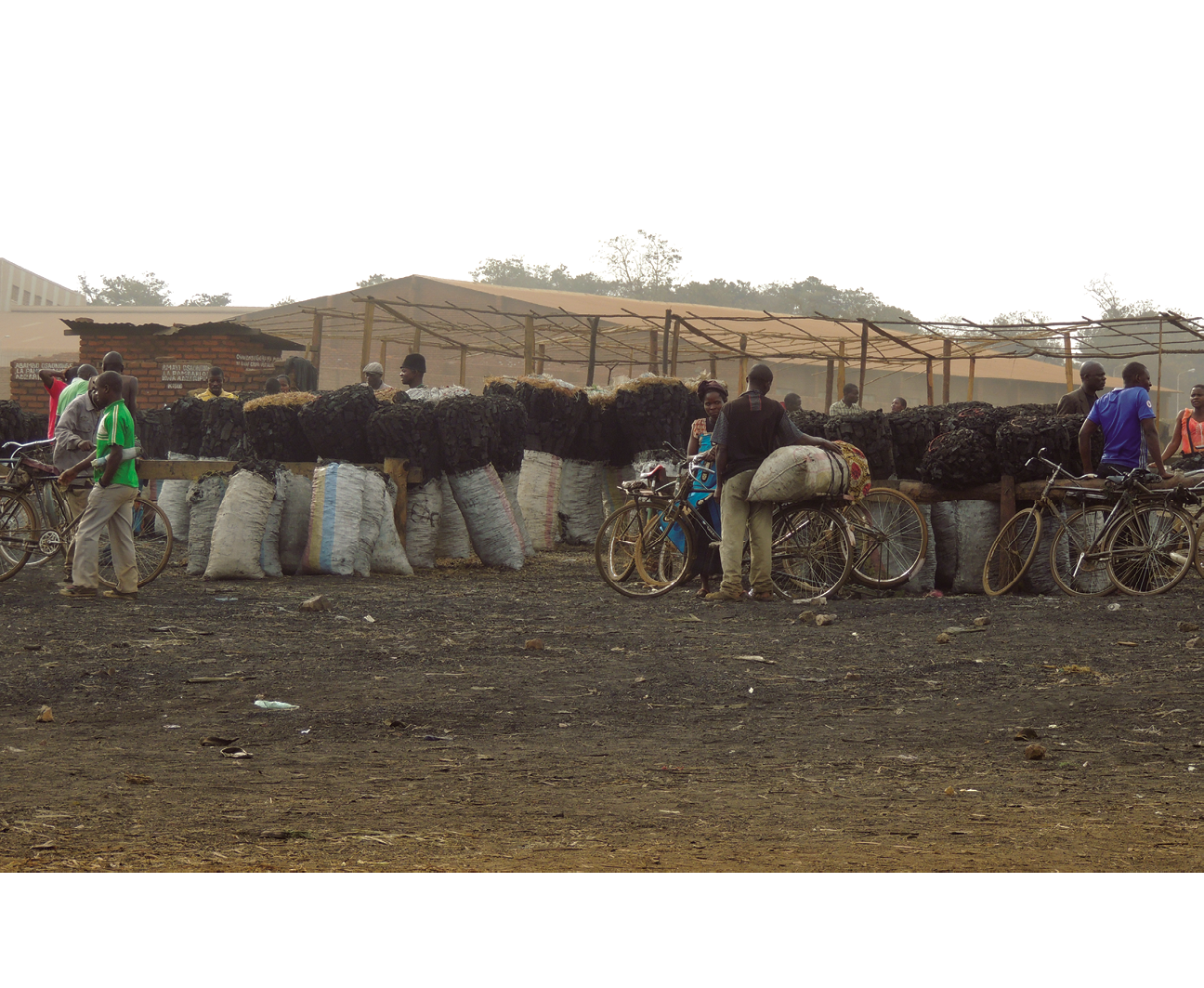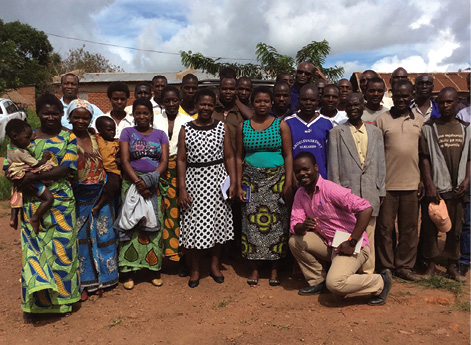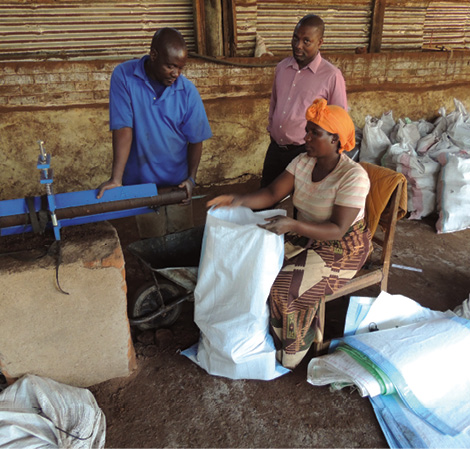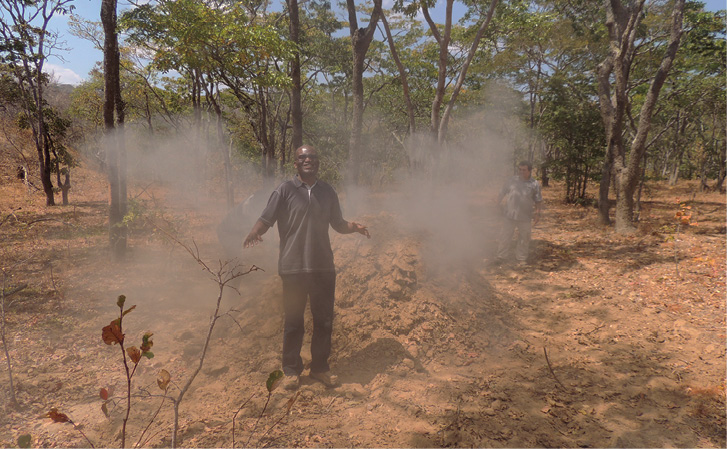The Seven Pillars of Sustainability: Charcoal, Alternative Energy, and Forest Management in Malawi
- Leo C. Zulu
- Associate Professor
- Department of Geography, Environment, and Spatial Sciences
- College of Social Science
 Malawi is one of the world's least-developed countries. Its economy is heavily based in agriculture, with a largely rural population. The government faces major economic, educational, healthcare, and environmental challenges, and has been working to overcome years of underdevelopment, corruption, and the impact of HIV/AIDS.
Malawi is one of the world's least-developed countries. Its economy is heavily based in agriculture, with a largely rural population. The government faces major economic, educational, healthcare, and environmental challenges, and has been working to overcome years of underdevelopment, corruption, and the impact of HIV/AIDS.
The country's outlook now appears to be improving. Malawi embraces a pro-Western foreign policy that includes positive diplomatic relations with most countries and participation in the United Nations and other international organizations.
Associate Professor Leo Zulu, of MSU's Department of Geography, Environment, and Spatial Sciences, is a Malawi native who has been closely involved with the country's recovery throughout his career. Zulu is something of a renaissance person. His background combines the social and natural sciences with years of professional experience in social forestry, biodiversity conservation, and public health.

Urban township charcoal wholesale distribution center, Lilongwe, Central Malawi.
"The big realization," said Zulu, "was discovering that forestry and environmental problems are more social than technical. You can teach people the techniques of growing and managing trees. That's the easy part. But managing human behavior is more complicated. There's this interface: This is a technical problem, but what will make people actually grow the trees? And spare some land to do that?"
His recent priority was a five-year (2014-2019) USAID-funded project, Protecting Ecosystems and Restoring Forests in Malawi (PERFORM), with PI David Skole and co-investigator Pascal Nzokou, both of MSU's Department of Forestry. This project seeks to build Malawi's capacity to benefit from international programs such as the United Nations REDD+ program[1] and ensure a low-carbon development pathway for Malawi.
The project included technical capacity building of the Malawian forestry and related personnel, said Zulu. "My colleagues were teaching them how to measure forests using techniques like satellite images and forest inventory and all of that. So there's community support and technical capacity building, and then there is the policy bit that I focused on."
A National Charcoal Strategy for Malawi

National Charcoal Strategy taskforce members meet communities in Ntchisi, central Malawi.
Zulu's assignment was to support the development of a national charcoal strategy (NCS). The demand for charcoal and firewood is driving deforestation in Malawi, thus undermining agricultural productivity, food security, water security, and hydroelectric power generating capacity. "With 97 percent of Malawian households dependent on firewood and charcoal as their primary cooking energy, we could not ignore this huge demand in any policy that was about protecting forests," he said.
Zulu worked with a multi-sectoral task force of diverse stakeholders, which was fine with him. "I'm really interested in how groups construct collective action on the ground," he said. "What makes it work, what doesn't work, what are the dynamics? At the end of the day it's about power relations—who has the power, how they wield it, who doesn't have it, how they react—around access to, control of, and management of forest and energy resources."
Leadership for Project PERFORM is complex. The primary contractor for project implementation is Tetra Tech, an environmental engineering company based in Pasadena, CA, with a global reach. As Ramzy Kanaan of Tetra Tech explained it, "I am the chief of party (overall manager) for PERFORM. I worked with the departments of Forestry and Energy Affairs to support development of the national charcoal strategy. This included working with both departments and Dr. Zulu to develop his scope of work. MSU is one of five subcontractors associated with the project."
The project began in 2015, when Malawi's Department of Forestry brought together a National Charcoal Forum of more than 150 experts, community members, and other stakeholders to build a shared understanding of the linked problems of deforestation, environmental degradation, and the growing scarcity of solid biomass resources. Consequently, a task force was established to develop a national charcoal strategy with support from PERFORM. The task force members collected information using interviews, focus groups, consultation visits to eight districts in Malawi's three regions, workshops in each region, and a study tour to Rwanda.

Making industrial briquettes from waste sawdust in the Zomba district.
Zulu supported this interdisciplinary team from the Department of Forestry, Department of Energy Affairs, other government agencies, and a non-governmental agency (NGO) in Malawi. The resulting National Charcoal Strategy 2017-2027[1] report prioritizes short-, medium-, and long-term strategies and action plans organized under seven interrelated pillars. The strategy was launched in July 2017.
As the task force started its work, charcoal was essentially banned in Malawi—despite its widespread use. Zulu said, "It's a weird thing. They know that a lot of people depend on it, but the way it's produced is still illegal, because a law that was passed in 1997 says if you're going to produce charcoal you must produce it from sustainably managed wood sources. But nobody had been licensed to produce charcoal sustainably since 1997, except one private agency in 2015. So all of this charcoal out there is illegally produced. Everybody knows it. Our idea was to provide a process for the legal production of charcoal in a sustainable way, but also encouraging alternative sources of energy. That's why this process involved lots of ministries."
Implementing the Strategy

Drs. Zulu and Skole view an earth charcoal kiln in Perekezi Forest Reserve, northern Malawi. Traditional earth kilns are wasteful, requiring 8-10 tons of wood to produce a ton of charcoal.
MSU's piece of PERFORM has been winding up over the past year. The capacity of the Malawi Department of Forestry and related government, academic, and NGO agencies to conduct forest inventory and carbon analysis using remotely sensed (satellite-based) data has significantly improved. Implementation of the NCS recommendations has been handed off to these partners.
Malawi's deputy director of Forestry Nyuma Mughogho, co-chair of the task force and now a member of the implementation team, said that "working with Dr. Zulu was a form of capacity building as well as learning together. We provided the practical experience in dealing with charcoal. Dr. Zulu carried out the research and drafted the NCS document. It was well formulated, and is now used as a model in how to develop a strategy. Work has now started on implementation."
Ramzy Kanaan agreed. "Partnering with MSU helped to leverage technical expertise, including training and capacity building," he said. "I believe Dr. Zulu's extensive knowledge of Malawi's forestry sector also helped advance the initial research conducted to support development of the NCS."
No Single Solution
As noted in the National Charcoal Strategy document, the linked charcoal and energy challenges are complex and no single solution exists. Each alternative process or product considered by the task force has its pluses and minuses.
Electricity is clean and energy-efficient, but delivery is unreliable (in urban areas) or unavailable (among most low income urban and nearly all rural dwellers). Likewise, liquefied petroleum gas (LPG) is efficient and relatively clean, but relatively costly and rarely used in Malawi. "People are suspicious of gas," said Zulu. "They think it will blow up and burn down your house." So these alternatives are best targeted initially to better-off urban populations.
In poor urban and rural areas, his team concentrated on more efficient charcoal production and cookstove design. "The idea is, you can target different subsections of populations and try this or that. Even if you don't shift them to other alternatives, you're still reducing the overall charcoal usage. It makes sense as a transitional plan to cleaner and more sustainable energy sources," Zulu said.
Sources
- http://www.un-redd.org/ Back to Article
- PDF available from: http://cepa.rmportal.net/Library/government-publications/national-charcoal-strategy-2017-2027/view Back to Article
- Written by Linda Chapel Jackson, University Outreach and Engagement
- Photographs courtesy of Leo Zulu and Project PERFORM